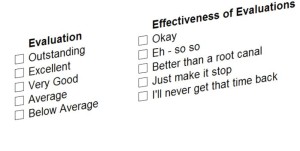Progress is being made to kill off the annual review in Corporate America, as up to 6% of Fortune 500 companies have officially made the decision to do away with them.
Surveys from mid-2012 were pretty conclusive that annual evaluations are not useful, yet they still continue to exist. Score one for the power of inertia.
First, I would like to take a look at the purposes of annual reviews:
- Gives the employee feedback on good performance
- Provides the employee with areas to improve performance
- Offers a forum for the employee and manager to have an open dialogue about performance and expectations
- Used to set future goals
- Address any changes in compensation
When I evaluate the list above, I only find one item that makes sense for an annual meeting, and that is related to compensation. Everything else should be happening on a more frequent basis, if not, then the manager is not doing a very good job in communicating with their personnel. If an employee is a rock-star, waiting a year to tell them that is evidence of a poor manager. On the flip-side, if they are missing the mark, that feedback should be provided much sooner, since withholding that information is both damaging to the employee and the organization.
Let’s face it, if a manager is maintaining a healthy and ongoing level of communication with their employees, then anything that would come out of an annual review, would essentially be old news. If that’s the case, there should be no reason to meet to discuss items that have already been addressed. In the context of justifying any changes, or lack thereof, in compensation, it can definitely be helpful to allude to prior feedback.
To drive home this point on the annual review, considering the following examples:
- Scenario 1: A basketball coach goes through an entire game and does the following: substitutes players so they can get rest, and tells them plays to run. At the end of the game, he tells the players what they did well and where they could improve. A fair person might conclude that the coach is not doing their job and should be providing feedback to their players throughout the game. Yet, this is only a game, we are likely talking a period of less than two hours. Imagine how much more effective his team might play if he coaches them, guides them to attack the opponents weak spots, instructs them on how to capitalize on their strengths, or asks them what they are experiencing in the game so he can help them adjust accordingly.
- Scenario 2: You own a machining company and purchase a new piece of equipment. How long would you let that piece of equipment produce faulty products until you had it calibrated correctly? A day, a week, a month, a quarter, a year? I realize that employees are humans and cannot simply be calibrated, but if their work is faulty, shouldn’t you continue to coach them on an ongoing basis. Certainly, you would not let a machine continue to turn raw inputs needlessly into waste.
If employees are the most important asset to a company (they usually are), and they are costly to procure (they definitely are), why wouldn’t you always be trying to maximize their output. If you praise good employees, they will continue to do good work. If you let bad employees continue to perform poorly, they go further off track, making it less likely to “fix” them, and their under performance can hurt the rest of the company. If the managers are doing their job, the annual performance review ends up accomplishing nothing, and should therefore be put to its long overdue death.


